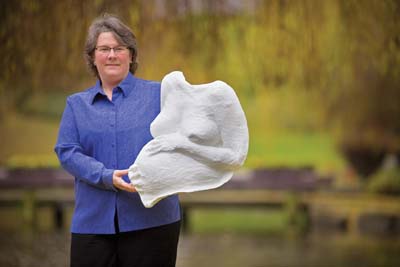 |
 |
| current issue |  |
past issues |  |
send a letter/news |  |
address update |  |
advertise |  |
about us |  |
alumni home |
Alumni Profiles
Blessing in DisguiseDoula Kimberly Radtke '89 creates maternal mementos
By Clare Kittredge

|
Kimberly Radtke '89 witnessed her first birth in 1990 as a Peace Corps health volunteer in a rural Moroccan village. A doctor at a local hospital invited her to watch as part of her training. "It struck me that I'd witnessed this incredibly powerful thing," Radtke says.
That was the beginning of her interest in all things relating to birth. Returning to the United States, Radtke began working in a Manchester, N.H., Planned Parenthood clinic. She happened to read Spiritual Midwifery, a book by Ina May Gaskin. The book's effect was galvanizing, and in 1994 Radtke moved to Seattle to attend the Seattle Midwifery School. After graduating, Radtke worked for six months as a midwife. A social work major at UNH, she found that she�Aeod rather be an advocate than a midwife. "I preferred empowering families in other ways. While I loved being present at births, I'm better suited to make sure families have midwifery as a choice." She started working as a doula, giving emotional and physical but not medical support during childbirth. In Greek, the word "doula" means a woman's servant.
In 1997, Radtke started a side business making bellymasks, plaster of Paris molds of a woman's pregnant belly, usually three weeks before a woman's due date. The mom sits still for an hour while Radtke works fast, applying wet plaster strips that, when dry, pop off as a bellymask. "It's considered a piece of art, and they display it in their office or home," she says. Some women paint their bellymask, and others leave it white. Radtke suggests that parents help older siblings and the newborn make handprints in nontoxic ink inside the bellymask as a memento. "The kids love it," she says.
All this prepared Radtke for her current job. Since 1998, she has been the coordinator of the Breastfeeding Coalition of Washington State in Seattle, where she lives with husband Keith Routley '90. Through her job, she works to promote breastfeeding. "I'm passionate about what I do. It's beyond just giving advice. It's about affecting policy, so mothers can begin and continue breastfeeding. It's all part of the spectrum of caring for mothers and babies."
Easy to print version blog comments powered by Disqus
